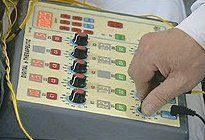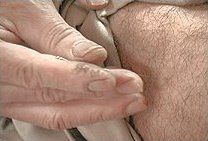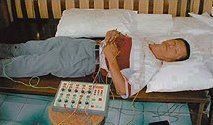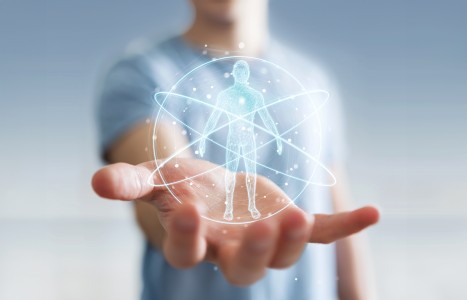As modern medical standardization continues, the field of traditional Chinese medicine has the advantage of comprehensive personalization. For rare or complex cases, deeper consideration of constitution is invaluable. Proper constitutional assessment, especially with first-time clients, can guide desirable and predictable outcomes. This leads to a higher rate of return, and greater trust between you and your patient.
Dr. Fuda: The Story of a Rural Doctor and Oriental Medicine's New Frontier
At 6:30 in the morning, patients from across Taiwan begin lining up outside his clinic door. They pour through his office until 11:30 at night - often up to 200 patients per day. With no assistant, no appointment book - not even a telephone - Dr. Fuda, of rural Mado, Taiwan, may run the busiest one-man acupuncture hospital in the world.
In 30 years, Dr. Fuda has gone through two million acupuncture needles and tens of thousands of patients. His right index finger is twice the size of his left, due to a lifetime of needle insertion. Recently, a small riot broke out in front of his clinic, forcing Dr. Fuda to post a sign stating that he would accept no new patients.

In a country that has nationally subsidized health care, and is saturated with TCM practitioners, Dr. Fuda's popularity stems from word-of-mouth success stories. Patients claim his innovative acupuncture techniques resolved stubborn symptoms and serious illnesses that conventional medicine and other local TCM practitioners couldn't.
Dr. Fuda's unique system uses electromagnetic stimulation through a streamlined series of major acupoints. Fuda believes the circulatory system is driven by electromagnetic charge, and that the blood also carries an electromagnetic chi "signal," a specific quality or wave pattern, throughout the body. He hypothesized that the signal communicated by the blood to the chi in a state of disease is corrupted, and sought a way to carry a signal via the circulatory system through the blood to reset the chi wave signal to that of a healthy body. His stimulation technique affects not only chi volume and direction; it ostensibly restores a certain qualitative aspect to the chi field itself.

Trained in a zen temple as a young man, Fuda initially used manual needle placement to restore health to his patients. He always suspected that conventional electronic acupuncture stimulation was too artificial for the human body to "digest." For years, Fuda tinkered with stimulation machines, grounding them through the earth, adding magnets and working with a tai chi master, to devise a specialized signal that more closely matched that of true human chi.
Over time, Fuda developed his own machine. Its signal, when delivered through key acupuoints, works to "reset" a patient's chi field to promote health throughout the body. Fuda has two general restorative layouts to clear and reset a patient's chi signal before he proceeds with symptom-specific treatment.
The method had unexpected results. Patients felt so much better simply from the general signal "clearing" that they would recover before receiving the disease-specific treatment. Other patients reported rapid reduction of serious disease symptoms, including several forms of cancer, while under Fuda's care.

Fuda gradually pared down the number of points used in conjunction with his equipment, since the new signal traveled through the body more efficiently. Through trial and error, he noted that some points receive and carry a charge better than others. Using between 2-8 points per patient, Fuda can now set up stations in his clinic that allow him to treat a larger number of clients more efficiently.
A small group of American physicians and acupuncturists traveled to Taiwan recently to observe Dr. Fuda's technique. Silas Harrington, an anesthesiologist from suburban Chicago who has also practiced acupuncture for 20 years, followed Fuda through his paces. "I had to wear track shoes," Dr. Harrington said. "The man simply never stops." Dr. Harrington continued: "He's effecting change in people that is definitely beyond the placebo or suggestive effect - favorably improving physical conditions and health. I saw conditions like hepatitis B or certain reported cases of cancer that appeared to be placed in remission while the individual received treatment."
Barry Brownstein, LAc, an acupuncturist from Tucson, Arizona, also witnessed Dr. Fuda in action. "Fuda is putting needles into points where there is bulk muscle tissue with a large amount of blood flow," he said. "Red blood cells comprise 75% of blood, and red blood cells are 75% iron - which is a highly magnetized substance. Everything happening in the body depends on the electrical balance in the blood. Restoring the right electrical signal carries the benefit to everywhere the blood flows; thus, every cell in the body." Mr. Brownstein noted that the most difficult part of Fuda's system was getting used to the larger Chinese needles. "I usually do Japanese-style acupuncture with very thin needles," he said. Brownstein has treated cases of shingles successfully using Fuda's technique, and had some mixed but promising results with cancer-related conditions.
Another American visitor, Michael C. Brooks, DC, learned the general layouts and brought a model of Fuda's equipment back to his Florida acupuncture practice. "As a tai chi practitioner, I've generally avoided electronic stimulation, feeling that it interfered with the natural balance of my patients. But Dr. Fuda's treatment actually felt good - stabilizing and balancing - like the chi sensation I can feel in my tai chi practice. I've had extremely good success with patients that haven't responded to other modes of treatment."
Also experimenting with Fuda's technique was Chun Lei Tsai, an acupuncturist who trained with Dr. Fuda on two separate trips to Taiwan, and benefited from speaking Fuda's native language. Tsai incorporates Fuda's technique at her practice in Chicago, and often arranges telephone consultations with Fuda in his home (at his home, not his clinic) to receive instructions on specific conditions.
Every observer shared an overwhelming admiration for Fuda: "He's inspirational." "A truly caring, peaceful, energetic man." "No matter how many people he'd seen that day, he truly connected with each and every patient - young and old."
Fuda is now 60 years old. Brownstein, Tsai, Brooks and others have urged Fuda to make his technique available to other acupuncturists. "Right now, Dr. Fuda simply won't leave his patients," one of them said. "It's critical that we find a way to preserve and pass on Fuda's discoveries before this opportunity is lost forever." Some have urged Fuda to boil down his technique for the restorative layouts into a one-day seminar, which would make him feel more comfortable about traveling to the United States without leaving his clinic for an undue amount of time.
A tai chi center in Oak Park, Illinois, is coordinating communication efforts in the U.S. with Dr. Fuda. The school's master, Waysun Liao, is a long-time acquaintance of Fuda and hopes Western practitioners will be able to employ and empirically track Fuda's method.
For information on Dr. Fuda's technique and future developments, visit www.taichitaocenter.com and click the "acupuncture" link.



